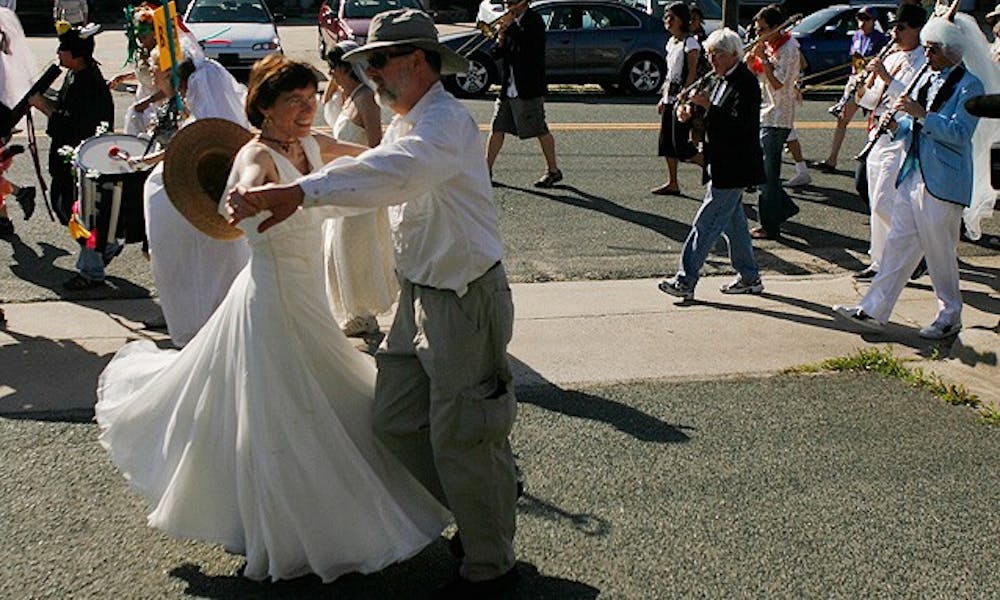I imagine the scene 10 years from now. My hypothetical fiancée and I reach a point in our relationship where it’s time for an attempt at complete honesty, and I have to make a confession.
“So, I was married once before,” I say, as nonchalantly as I can.
“What? Who? When? How?” she shoots back.
I start with the when: March 19, 2011. “Who” would be a little more difficult to answer, since I married approximately 270,000 people at once.
To assuage my fiancée’s dismay and confusion, I say I married Durham, North Carolina. More precisely, I entered into a civil union with the fair city, and I wasn’t the only one. Two thousand other Durhamites also joined hands with our metropolis to raise money for five local non-profit groups.
But personally, I still find the concept of marrying/civilly uniting with a city a little weird. Before you deem me uptight, look at where I am coming from, and I mean that literally. Depending on who you ask, my hometown of Alpharetta, Georgia is either a strip-mall hell or a tidy bedroom community an hour’s drive—thanks to endless, mind-numbing traffic—north of Atlanta.
Once upon a time Alpharettans might still have had a deep attachment to their town, but when I got to know the town it had basically been swallowed up by Atlanta’s metropolitan behemoth and its accompanying freeways, cookie-cutter houses and, of course, strip malls.
Coming from a town where I strongly suspect block parties are illegal, standing amid that crowd of 2,000 for this communal wedding felt very foreign at first. To get a better grasp of what it meant to marry Durham, I sought out locals who seemed ready to dive into marriage with the Bull City.
Marilyn Hayes, an information technology consultant decked out in a wedding dress and veil, told me why she wanted to marry.
A resident of the city for 25 years, Hayes described herself as Durham’s “biggest booster.” She said she loves the city—“the best little place in the world”—and its residents for their willingness to embrace diversity and the occasional offbeat idea. That includes marrying their beloved hometown.
“It is absolutely worth it to make the commitment,” she said. “Where else are you going to find a place like this?”
Hayes and her partner are taking the plunge together, so there’s little jealousy surrounding the process, she added with a laugh.
Bill Bell, the mayor of Durham since 2001, had the proud task of giving away the city.
Bell said he believes this wedding is a distinctly Durham approach to community building.
“I’m not saying that it couldn’t happen, but it didn’t happen at the other places I lived,” he said. “I don’t think there has been an event like this before in any city or other municipality in the United States.”
It was private groups, not the city government, who planned the wedding, Bell explained, demonstrating how Durham is an activist community that embraces its diversity.
As a fellow transplant, I could definitely get on board with community activism and eagerness to embrace diversity. I wondered, though, about how a person merges two identities: Dukie and Durhamite.
Dean of Students Sue Wasiolek came to Durham as a Duke undergraduate in 1972, but it took 38 years for her to be ready to tie the knot.
“It was not love at first sight,” she said. “I definitively would not have married Durham at the time.”
Wasiolek said when she arrived as an undergraduate, most of what she had heard about Durham were rumors of high crime and racial tensions, but her experience as a student made her more open to the city’s offerings. Attending law school at North Carolina Central University gave her another perspective on Durham, she said, and her many years as an administrator and resident gradually eroded her apprehensions about the city.
“Since I’ve lived and worked here, I’ve come to know Durham better,” she said, “and I’ve come to appreciate it more.”
Today, Duke students have plenty of opportunities to develop a great relationship with the city, said sophomore Benton Wise, another Durham newlywed. With the plethora of Durham restaurants and events and new means for transportation like the Bull City Connector, he said he feels Duke students have few excuses to confine them-selves to the Gothic Wonderland.
“To make the vows, though, you really need to know the city,” Wise said.
All of this got me thinking, how well do I know Durham? I’ve lived in the Bull City for eight months, and I know my interaction with the city extends beyond going to and from Shooters II. I have attended city council meetings as a Chronicle reporter, tutored local Latino immigrants in English and frequented a variety of Durham establishments apart from the notorious “saloon.” (I highly recommend Books Do Furnish A Room on West Markham.) That being said, my marriage to the city made me realize we still have room to grow. In my vows to Durham, I promised to “keep our streets clean and safe, protect our natural resources, shop locally, support the arts and local non-profit organizations, cherish diversity and elect responsible leaders.”
All of us will be Durhamites for at least four years. Whether you love Durham, hate it or feel completely ambivalent, try to make sure your feelings are based on personal exploration—not secondhand information. And if you really do love Durham, why don’t you marry it?
Get The Chronicle straight to your inbox
Signup for our weekly newsletter. Cancel at any time.

